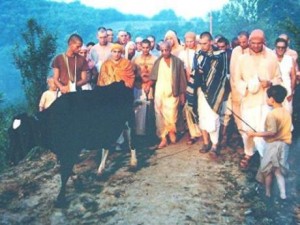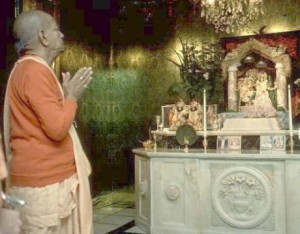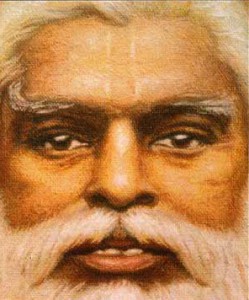
Srila Prabhupada meets his old friend Kaliya (the cow) on the path to the New Vrindaban farmhouse, 1976
“That’s the First Cow of New Vrindaban, Srila Prabhupada.”
Radhanatha Swami recalls a 1976 visit Srila Prabhupada made to the old farm quarters in New Vrindaban. Prabhupada had lived in that primitive woodland setting for a month in 1969 when it was the entire New Vrindaban. Although he had frequently visited the growing New Vrindaban project, Prabhupada had never gone back to the old farmhouse.
“If you can clean this place up, I will bring him up,” said Kirtanananda Swami, but later he changed his mind. “We are not going to bring Prabhupada up here. He’ll say it looks like a jungle. It is not proper.” Radhanatha was disheartened to hear it, because he was the pujari of the Deity Radha-Vrndavananatha, who resided in the little temple farmhouse. He had been feeling it would be the perfection of his devotional service to Radha-Vrndavananatha if the pure devotee, Srila Prabhupada, would come to associate with Him. He decided to at least bring a picture of Radha-Vrndavananatha for Srila Prabhupada to see.
One day during Srila Prabhupada’s visit, Kirtanananda Swami introduced Radhanatha to Srila Prabhupada and told him he had been making Srila Prabhupada’s sandesa.
“Very nice,” Srila Prabhupada replied. Radhanatha then showed Prabhupada an eight-by-ten picture of Radha-Vrndavananatha. Srila Prabhupada looked at Them silently and meditatively for about a minute. Then he began glorifying Lord Krsna. He said Krsna in Vrndavana is the sweetest. When Krsna stays in Mathura, Dvaraka, that is city beauty, but when He is in the village of Vrndavana, His beauty is the sweetest. While saying this, Srila Prabhupada continued to glance at the picture of Radha-Vrndavananatha. He then spoke of how Krsna goes out to the pasturing ground with His buffalo horn and flute to herd the cows and play with His friends. Krsna and His friends would get so absorbed in their play that mother Yasoda would have to go out and get Krsna to bring Him home.
“Where are these Deities?” Srila Prabhupada asked Kirtanananda Swami.
“They are at the original farm,” said Kirtanananda Swami, “the place you stayed many years ago.”
“You can take me there to see Them?” asked Srila Prabhupada.
“It is very difficult to go there,” Kirtanananda Swami replied. “The road is very bad. It would be uncomfortable for you.”
“You have a jeep?” Srila Prabhupada suggested.
Seeing Srila Prabhupada’s persistence, Kirtanananda Swami said that they would make all arrangements for his going there.
When the brahmacaris from the old farm heard the news, they were ecstatic. They tried their best to clean and make ready their backwoods temple and planned how to greet Srila Prabhupada. Radhanatha emphasized that Kirtanananda Swami said it was important that the recording of the “Govindam” prayers begin as soon as Prabhupada walked through the doorway to the temple. Therefore, the tape recorder should be cued and placed strategically. A guard should stand down the road and another near the house to signal Prabhupada’s advance toward the temple. Radhanatha, the pujari, would stay poised by the recorder, ready to press the button at the right instant.
Meanwhile, Srila Prabhupada traveled three-quarters of the way to the farm by pickup truck but then decided to walk the last part as his daily morning walk. As he walked, all the “guards” went to join him. Passing a black cow, one of the devotees said, “That’s the first cow of New Vrindaban, Srila Prabhupada.”
“Yes, I know Kaliya,” Srila Prabhupada replied. Finally he walked up to the temple and entered. Somehow, the other devotees were all detained outside and Srila Prabhupada entered the temple room alone. He stood with palms folded, looking at the surprised Radhanatha. A bit belatedly, Radhanatha pushed the button, and “Govindam” began. They then opened the curtains, and Srila Prabhupada stood to one side, looking at Radha-Vrndavananatha. He nodded his head approvingly to the Deities and then to the pujari. After a few moments, Prabhupada went to the rear of the room and sat on the rustic-looking vyasasana. Sublimely and naturally, he began to give the morning Srimad-Bhagavatam class.

Srila Prabhupada takes darshan of Sri Radha Vrindabanatha at the original New Vrindaban farmhouse, 1976.
Radhanatha Swami, interview. Prabhupada showed more than once how he immediately felt quite at home in New Vrindaban, and the Prabhupada-lilamrta describes this in telling of Prabhupada’s first visit there. Although he was accustomed to big cities, as soon as he came to a place like New Vrindaban or to the farm in Hyderabad, he was at ease and quite happy with such primitive living conditions. In India, Prabhupada had also spent most of his early years in the cities: he grew up in Calcutta, had his business in Allahabad, and he traveled as a businessman. But his attraction to such simple forest settings is transcendental. He also told us that Krsna is attracted to such a setting in the original Vrndavana. Prabhupada always became enlivened at the prospects of varnasrama-dharma, village life and cow protection when he came into these settings. It enlivened him to see the Krsna conscious farm developed in a simple setting.
Radhanatha Swami tells that on one occasion in New Vrindaban, Prabhupada said the devotees should stay in New Vrindaban and be satisfied. It was the same thing Kirtanananda had been repeatedly telling the devotees. Now that Prabhupada said it, it became a great confirmation for the devotees there. Prabhupada was satisfied to stay at their farm community and they should follow that example.
- From Prabhupada Nectar by HH Satsvarupa dasa Goswami
 From Bhumi Vrndavana in India, Kadamba Kanana Swami travelled on to Villa Vrndavana, a beautiful Hare Krsna Villa situated close to Florence in Italy. Maharaja, together with many fantastic kirtaniyas like Amala Harinama, Tarana Caitanya and Ojasvi, filled the 12 hours of daily kirtan with beautiful and ecstatic melodies. Maharaja also gave daily classes, first focusing on the Srimad Bhagavatam and then, during the weekend, lecturing on harinama verses from the Caitanya Caritamrita.
From Bhumi Vrndavana in India, Kadamba Kanana Swami travelled on to Villa Vrndavana, a beautiful Hare Krsna Villa situated close to Florence in Italy. Maharaja, together with many fantastic kirtaniyas like Amala Harinama, Tarana Caitanya and Ojasvi, filled the 12 hours of daily kirtan with beautiful and ecstatic melodies. Maharaja also gave daily classes, first focusing on the Srimad Bhagavatam and then, during the weekend, lecturing on harinama verses from the Caitanya Caritamrita.





